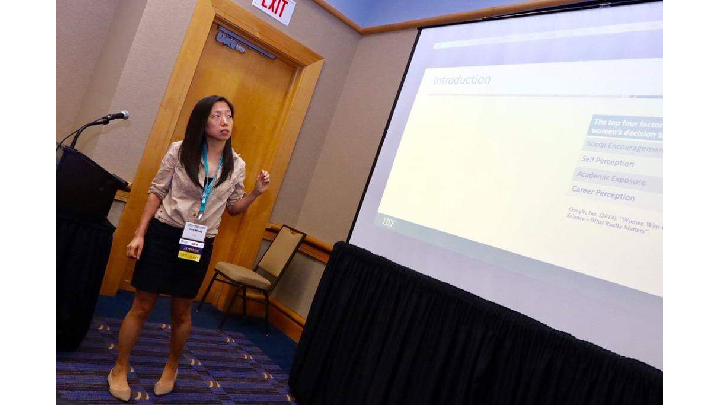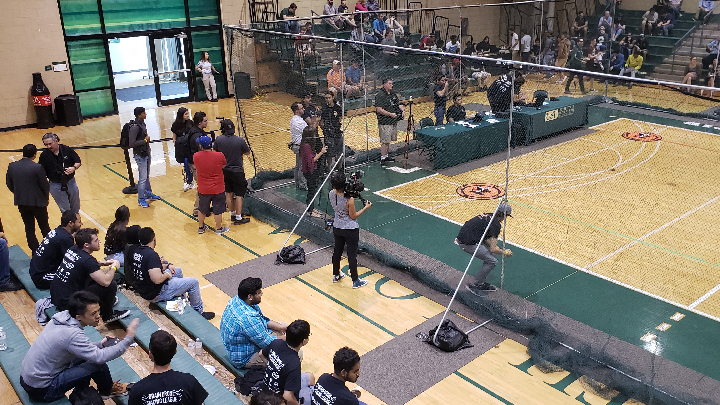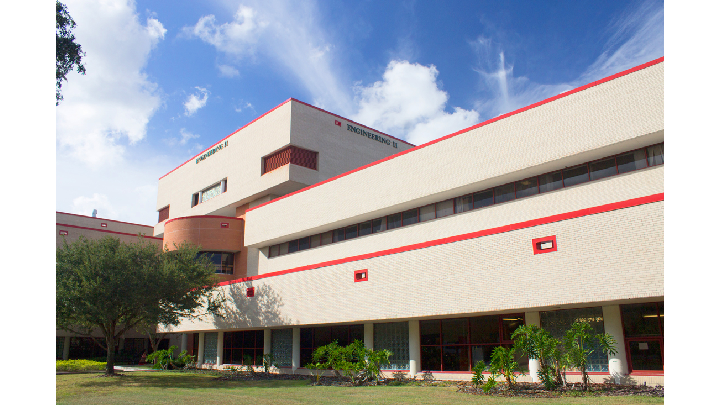According to Academic Analytics Scholarly Research Index AAD2019 released in April 2021, the USF Department of Computer Science and Engineering is in the top 10% of computer science departments among U.S. public universities. The index takes faculty members’ research grant funding, published articles, awards, book publications, academic citations and conference proceedings into account.
“The department’s position in this index is the result of the value that department faculty members consistently place on high quality research and their commitment to their students,” said Department of Computer Science and Engineering Chair and Professor Sudeep Sarkar. “This has been a steady effort throughout the years that is continuously built upon.”
The department has 28 tenure-stream faculty and 12 full-time instructors, many of whom are IEEE, AAAS, IAPR, and AIMBE Fellows. 12 are NSF CAREER award recipients, and three are Distinguished University Professors. Our faculty members value research, teaching, and service. Multiple faculty members have been awarded Outstanding Undergraduate Teaching awards from the University.
Department faculty members are very involved with service to the community and professional societies including IEEE-CS and ACM. Faculty members are currently executing $9.7 million in active external research grants from NSF, Department of Defense, NIH, NIST, industry, and state sources. Research clusters in the department include AI and cognitive computing, cybersecurity, big-data science algorithms, and efficient computing platforms.
Former USF Department of Computer Science and Engineering Chair Rangachar Kasturi said that a major focus of the proposal he created to encourage the department’s growth in Spring 2003 was hiring more tenure track faculty, instructors and teaching assistants while improving the balance of teaching and research faculty members were expected to have.
“The overall value system has essentially remained the same,” Kasturi said. “More support courses are taught by tenure-track faculty as well as instructors, and there are more TAs for assisting in labs and for teaching support. Students wanted better access to faculty and more courses taught by faculty.”
Other proposal goals included a higher number of students who earn their Ph.D. at
USF, more
faculty-led research and increased department funding, which were all achieved.
Former USF Department of Computer Science and Engineering Chair Larry Hall said he sought to increase the amount of time faculty members worked with Ph.D. and master’s students during his time as department chair from 2008 to 2015.
"To give them time to do that, we encouraged faculty to get more funding to support Ph.D. students," Hall said. “I think that had a positive outcome in more funded Ph.D. students to do more research work funded by the National Science Foundation, the National Institutes of Health, the DOD and more. I think that kind of research experience gave them a good basis for their future careers. Our students have gone on to achieving success in industry research labs or at good universities in academia. Our master’s students are in strong demand.”
Part of positioning graduate students for success results from the experience of a number of department faculty members who have been general conference chairs and on the organizing committees of prestigious research conferences, which helps them guide graduate students towards high quality research publications and facilitates professional connections. Hall also personally helped a number of students transition from a variety of disciplines into computer science, many of whom went on to find success at the graduate level.

USF Department of Computer Science and Engineering Professor Jing Wang presents research on the impact of the USF Women in Computer Science and Engineering (WiCSE) chapter at the 2019 ASEE Annual Conference & Exposition.
USF computer science doctoral alum Mark Powell completed his bachelor’s, master’s and Ph.D. all within the department. After achieving his Ph.D. in 2000, Powell transitioned into a software developer position with the NASA Jet Propulsion Laboratory designing a suite of cutting-edge visualization software that turned images taken by Mars Exploration Rovers Spirit, Opportunity and Curiosity into 3D landscapes and mosaic views.
Powell said these views coupled with satellite images add context to existing information gathered by the many interdisciplinary scientists that process data and samples from rovers. Researchers can, for example, view the chemical composition of a small area in a region on Mars in the broader light of how the surrounding Martian landscape would appear both to astronauts and to satellites above the planet.
“They’re much more interesting when you can put them into the overall picture of everything we know about Mars,” he said. “These days, the state of the art of creating that context is taking 3D imagery from rovers and putting it into an AR environment with tools like Microsoft Hololens so you can walk around in a virtual Mars environment and put yourself as close to boots on Mars as you can get.”
Powell added that his Ph.D. program was directly responsible for him finding his career at the Jet Propulsion Laboratory. While he’d previously reached out to computer vision researchers at the laboratory, job opportunities were scarce.
“The work that I did at USF in vision in particular and image processing trained me as if I had known about the job opportunity 5 years before it existed,” he said. “When it finally came to me, I had a body of work that made me so well-aligned with the job description that I was practically a shoe-in for what they needed at the time. I couldn’t have benefited more from the preparation and the particular skillset and experience via my graduate work for my career at JPL when I started.”
Currently, Powell is the laboratory’s lead mobile platform developer and oversees the development of a wide variety of apps. He said he’s also starting his own LLC focused on his work in mobile applications and inspired by recent entrepreneurial programs at USF.
USF computer science doctoral alum Sathyanarayanan Aakur said he had some unique opportunities to help foster entrepreneurship through the USF NSF I-Corps program while working with Sarkar.
NSF I-Corps is a public-private partnership program that teaches university faculty members to identify valuable product opportunities that can emerge from academic research and offers entrepreneurship training to participants. Currently an assistant professor at the Oklahoma State University Department of Computer Science, Aakur said helping run part of the program during his last year of his Ph.D. in 2019 helped him teach a widely offered machine learning class last fall.
The course was cross-listed to majors across the entire university, and Aakur ended up having around 50 students ranging from biology to computer science. He said his experiences observing industry professionals teach entrepreneurial skills to faculty members from a variety of disciplines during the I-Corps program taught him how he could engage with his students from different backgrounds under a common vocabulary and through a frame that would be engaging for all his students while building up to more technical details.
Previously, the first class Aakur taught as an assistant professor was a graduate-level operating systems course. He said that having the chance to teach two prior classes at USF as a TA and an instructor helped him prepare during his transition from student to professor.
“It really helped him merge different styles of teaching from the professors that I’ve worked with into my own course,” he said. “I tried different things, like flipped classrooms, that I’ve seen Dr. Sarkar teach in his course,” he said. “I got pretty good ratings that semester as well.”
The first course Aakur taught at USF was online, which he said helped him stand out from other assistant professor candidates.
“When people look at tenure-track applicants, having teaching experiences really helps, and me and my classmates had online courses that we could TA,” he said. “A lot of programs are encouraging online teaching experience, and most of us got the chance to teach, especially if we expressed interest in academia. That really helped us beef up our CVs for academia.”

USF’s first brain-controlled drone race was organized and held by faculty and Ph.D. students from the Neuro-Machine Interaction Lab, located within the Department of Computer Science and Engineering in 2019.
Associate Professor and Endowed Robley D. Evans Faculty Fellow with the Department of Electrical and Computer Engineering at the University of Kentucky Himanshu Thapliyal completed his Ph.D. at USF in 2011. Thapliyal is an IEEE senior member and received an NSF CAREER Award supporting his research in improving the security and energy usage of IoT devices while helping broaden participation of students underrepresented in cyber and hardware security research and education.
He joined communications tech leader Qualcomm as a senior engineer in 2012, which gave him experience working in industry on products that would come to market. While he ultimately knew he wanted to become a professor, he credits the experiences he had in his Ph.D. program at USF and at Qualcomm with the success he’s found in his career, including an IEEE TCVLSI 2020 Mid-Career Research Achievement Award and his students securing jobs at Intel, Microsoft, Raytheon and Oak Ridge National Laboratory.
“Many schools have computer science and computer engineering in a separate department, but USF has them together which gives it a unique edge,” he said. “That gives students a lot of opportunities to take courses on computer science as well as engineering while being in the same department. That way, you get a depth of research experience while getting a wider breadth of academic experience for a solid foundation to work in different research areas and teach more courses if you become a professor.”
